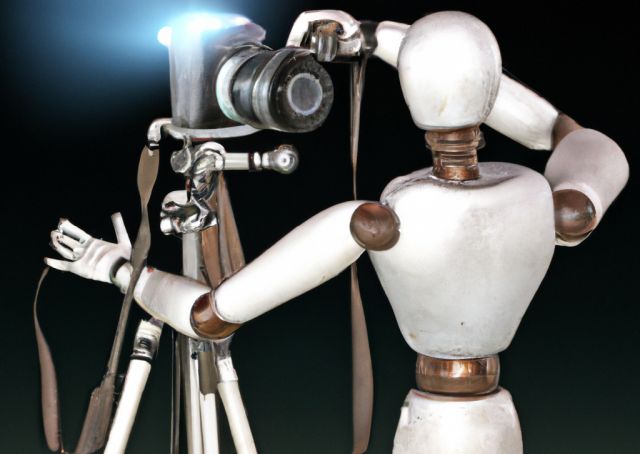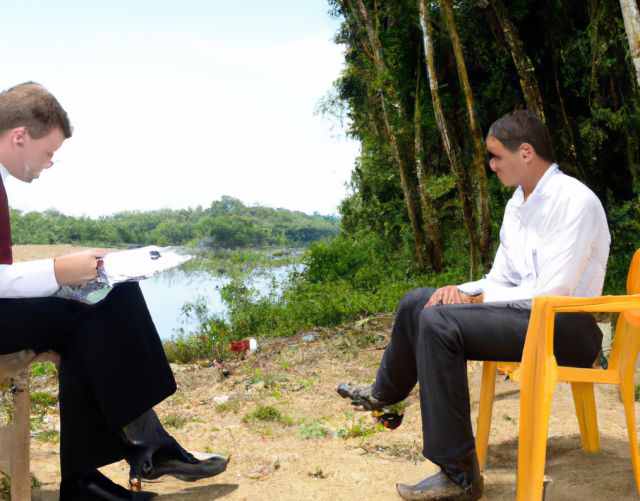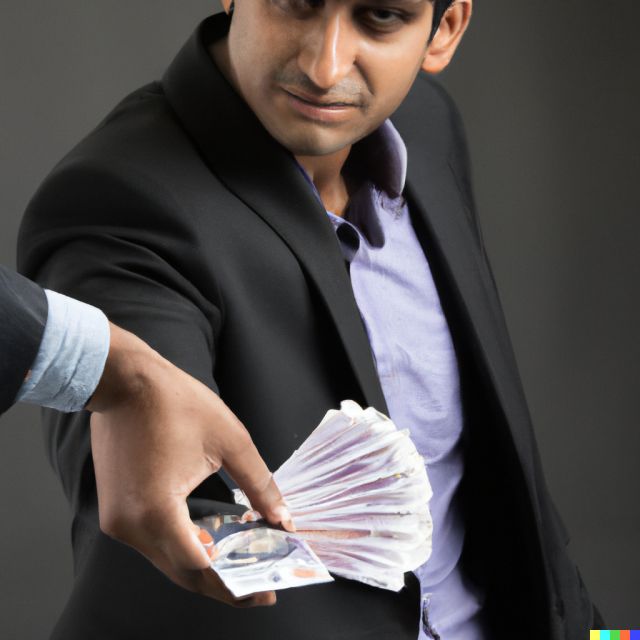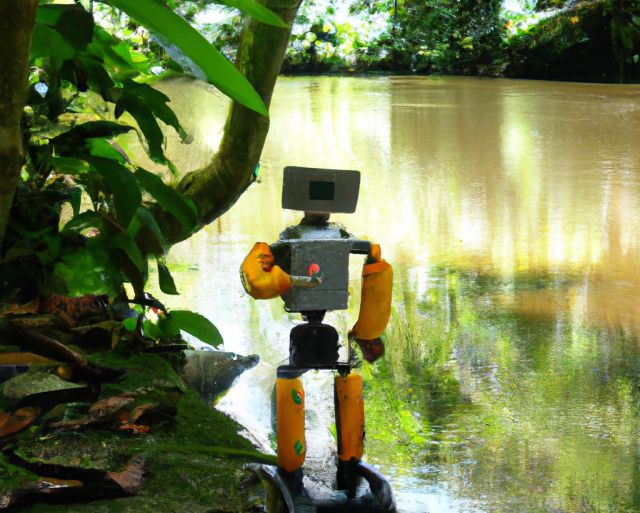The march of the robo-photo
IS STOCK photography doomed to be replaced by synthetic images - robo-photos? Mike Holderness takes a look at what's happening - including an offer to compensate photographers.
LET'S START from the point of view of those who pick photos. Every designer of publications that have mediocre budgets has been here: the printers are baying for the pages. There's this feature on - you think - employment legislation. You sigh and go to a stock photo library. There's a bunch of shiny images - and one appears to show a Human Resources operative being best smiley shiny friends with a happy employee. It'll do.

A robot photographer - possibly pointing the camera the wrong way - generated by Dall-e-2
It costs your client a few pounds. The photographer should get some of those - but they may get a lot of small payments.
Then there's this feature about the Amazon. Obviously you can't afford to send someone. And those who've been there want, reasonably, substantial sums.
But perhaps technology can come to your rescue? On 25 October stock library Shutterstock announced a deal with openai.com to offer "in the coming months" synthetic photographs generated by its Dall-e-2 image generation system.
So we asked Dall-e-2 for an image of a human resources meeting in the Amazon. It offered four, of which the most stock-photo-like is this:

A human resources interview in the Amazon - generated by Dall-e-2; we have tried a reverse image search to find out who took the photo that forms the background, and failed
This image has tell-tale signs of not being an actual photograph. It gives us an opportunity to discuss "egregious noses". But the Freelance suspects those tell-tales could be ironed out - if, indeed, they've not been deliberately coded in to get people used to robo-photos without invoking the unease of "uncanny valley" - the zone where an artificial image is close enough to a real one that it's disturbing.
Is stock dead, then?
Quite likely, yes, stock photography could well go the way of high-street photography studios doing passport photos. The insatiable maw of pages requiring generic images will be fed - at the lowest cost possible. The quality will improve - though it would be interesting to know the carbon footprint of all this.
The machine-learning systems are "trained" on many millions of actual photographs taken by live photographers. It would seem that the outputs are "derivative works" of those input images. In theory, the photographers should be able to demand licensing. In the case of the literal-minded examples generated for this piece, the input images are used pretty much as is - the machine-learning system has merely generated a montage.
A promise of compensation
Shutterstock's press release includes the following:
Given the collective nature of generative content, we developed a revenue share compensation model where Contributors will receive a share of the entire contract value paid by platform partners... The share individual contributors receive will be proportionate to the volume of their content and metadata that is included in the purchased datasets.
The Freelance is approaching Shutterstock for more details of this scheme.
Ethical minefields ahoy!
The potential for abuse is, of course enormous. Robo-photos will be increasingly passed off as reportage.

For the avoidance of doubt, this is not a photograph of Rishi Sunak taking a bribe: it was generated from that prompt by Dall-e-2 - which, as do many human painters, has trouble with hands
This has the potential to undermine faith in photography as reportage. Though the un-groundedness of that faith may be the subject of hundreds of MA dissertations, it is to say the least important to the concept of fair news reporting.
It seems that such an undermining plays into the hands of right-wing authoritarians whose strategy is to convince voters that nothing is true - so they may as well make their choices on the basis of anger at imagined or confected slights. Consider the statement by Steve Bannon, sometime adviser to Donald Trump: "The Democrats don't matter... The real opposition is the media. And the way to deal with them is to flood the zone with shit."
It is to say the least disappointing that such vital issues have so far played little part in legal and policy discussions.
What does UK law say?
As noted above, robo-photos are in UK law almost certainly "derivative works" of the input images on which the systems are trained. In the US the position is much less clear because of the courts' steady expansion of the notion that whether use of an image is "fair use" may be determined by how much the use is "transformative". In the UK, though, it would be interesting to see what happened if one of the photographers whose works are included in the images here sued openai.com - and please note that the Freelance is willing to pay a reasonable fee out-of-pocket.
UK law is unusual in that it grants a copyright in computer-generated works: "In the case of a literary, dramatic, musical or artistic work which is computer-generated, the author shall be taken to be the person by whom the arrangements necessary for the creation of the work are undertaken." This copyright expires "at the end of the period of 50 years from the end of the calendar year in which the work was made". These rules apply where the work is generated by computer in circumstances such that there is no human author of the work". I believe I "made the arrangements" for the images here; whether my selection from the options offered means that a human author was involved I have no idea. There is hardly any case-law on this provision.
In a consultation on artificial intelligence the UK government Intellectual Property Office (IPO) considered removing this to encourage a bright shiny British artificial intelligence industry, but thought better of it.
OpenAI's current terms of use state that "to the extent permitted by applicable law, you own all Input, and subject to your compliance with these Terms, OpenAI hereby assigns to you all its right, title and interest in and to Output." Forbes magazine observes that before the deal with Shutterstock there was no way to licence a Dall-e image and that the deal "may be the key to creating a sustainable business model around the nascent technology" - in which case those terms, whatever they may turn out to mean, are going to have to change.
Free mining for robots?
What the IPO did propose after the consultation was a new copyright "exception" that would allow text and data mining (TDM) for any purpose. As the Freelance observed at the time, that legitimises the practice of Google and others of hoovering up photos to train image recognition and now image generation systems. We have no indication when this proposal might be put to Parliament. We are discussing opposition to it.

A robot photographer in the Amazon - generated by Dall-e-2; we have tried a reverse image search to find out who took the photo that forms the background, and failed
More cautious agencies
Craig Peters, Chief Executive of photo library Getty told The Verge that other companies weren't thinking through the hazards. Getty had banned robo-photos in September. It announced a partnership between the company and Israeli firm Bria to offer AI-powered image editing tools. Peters said "There's a lot of questions out there right now — about who owns the copyright to that material, about the rights that were leveraged to create that material — and we don't want to put our customers into that legal risk area... There have been assertions that copyright is owned by x, y, z, by certain platforms, but I don't think those questions have been answered."
 LETTER: Robo-photos don't work like that
LETTER: Robo-photos don't work like that
 Robo-photos are still making waves Jan 2023
Robo-photos are still making waves Jan 2023
 Repair robot rights! UK government pauses free mining for robots - and more US lawsuits
Repair robot rights! UK government pauses free mining for robots - and more US lawsuits
![[Freelance]](../gif/fl3H.png)